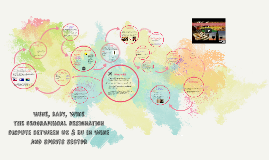Wine
Transcript: Red? White? Dancing Bull Zinfandel $10 Turley Dogtown Zinfandel (2006) $80 1. Shiraz (Shi-raz) Origin: California, Australia & France. Meal pairings: Steak, beef, stew etc. Typical Flavor: Black fruit flavor, spicy, chocolate, or truffle. NOTE: darkest colored grape= INTENSE Lindemans $9 Henschke $105 Barefoot $8 Robert Mondavi Reserve $140 4. Malbec (Mal-bek) Origin: France, Argentina, California, Chile and Australia. Meal Pairings: All meats, Particularly foie gras (duck liver). Flavor: Plum, berries, spice and earthy undertone. NOTE: Known for its easy drinking. (not meant for light meals) 4. Moscato (Mos-cato) Origin: Italy and Austria. Meal pairings: Dessert items. Flavor: Fruity; grapefruit. 3. Semillon (Say-mee-yaw) Origin: France, California, Australia, Chile & Argentina. Meal pairings: Seafood. Flavor: strong berry and fig like. What's the Occasion? 1. Fancy dinner with friends & family 2. Business dinner 3. Casual dinner 4. Getting CRUNK 6. Zinfandel (Zin-fan-dell) Origin: California. Meal Pairing: Pizza, pasta & meats. Flavor: Zesty= berry & pepper. NOTE: stronger wine taste. 6. Gewurztraminer (Gah-vurtz-tra-meener) Origin: Germany, U.S.A. Meal pairings: asian food, pork and sausages. Flavor: Fruity- peaches and lychees. NOTE: Not as refreshing as others. OR There are eight different kinds of red: 1. Shiraz (Shi-raz) 2. Merlot (Mare-lo) 3. Cabernet Sauvignon (ca-burr-nay so-veen-yaw) 4. Malbec (Mal-bek) 5. Pinot Noir (Pee-know Na-wahr) 6. Zinfandel (Zin-fan-dell) 7. Sangiovese (san-gee-oh-ve-zee) 8. Barbera (Bar-bear-a) 3. Cabernet Sauvignon (Ca-burr-nary So-veen-yaw) Origin: France, California, Australia, South Africa, New Zealand and Chile. Meal Pairings: Simply prepared red meat. Flavor: Black currant, chocolate, and cedar. NOTE: most famous red wine. (formal) 7. Riesling (Rees-ling) Origin: Germany and California. Meal pairings: Fish, chicken, pork & Japanese. Flavor: Fruity; apple. NOTE: known for its light freshness. Bibliography 1. http://www.frenchscout.com/types-of-red-wines 2. http://www.fitnessmagazine.com/recipes/drinks/wine/heart-healthy-benefits-of-wine/?page=1 3. http://www.wineanorak.com/howwineismade.htm 8. Barbera (Bar-bear-a) Origin: Italy. Meal pairing: Anything with tomato sauce. Flavor: Silky texture- smooth, black cherry & plum. NOTE: Almost tart tasting, poor with creme sauce. - Converting sugar to alcohol - Harvested at Brix (certain % of sugar) - Ripeness determines quality - Grapes crushed then fermented in a tank with yeast - Color and flavor= temperature and speed of fermentation over skins - White wine = same except no skin Stone Cellars $8 Ornellaia Masseto (2009) $450 1. Chardonnay (Shar-do-nay) Origin: California, France, Australia, Italy, Moldavia, South Africa, Chili and Argentina. Meal Pairings: Fish and chicken dishes. Flavor: Citrus fruit flavor. 1. Choose the occasion 2. Choose the color 3. Choose the type ENJOY! 2. Sauvignon Blanc (So-veen-yawn Blah) Origin: France, New Zealand and Australia. Meal pairings: seafood, chicken & salad. Flavor: green fruits (apple) to tropical fruits (mango). NOTE: rather smokey quality from oak. 7. Sangiovese (San-gee-oh-ve-zee) Origin: Italy & California. Meal pairings: Italian & Mediterranean cuisine. Flavor: Spicy fresh berry, oak, vanilla and Plum. Barefoot $7 Bonnes Mares Grand cru $500 Ingoldby Shiraz (2010) $15 Brezza Barbera dAlba Cannubi (2009) $50 Banfi Chianti Superiore (2010) $11 Valdicava Brunello Riserva (2006) $1,100 5. Pinot Noir (Pee-know Na-wahr) Origin: France, Germany, Australia, California, Chile, Oregon and New Zealand. Meal Pairing: Salmon, chicken, lamb and Japanese dishes. Flavor: Soft, light wine, fruity (cherry, strawberry and plum). NOTE: Elegant wine (formal) El Portillo Malbec (2011) $10 Vina Cobos Cobos Malbec (2008) $175 5. Pinot Grigio (Pee-no gree-zo) Origin: Italy, U.S.A, France, Germany, Austria and Australia. Meal pairings: Thai or spicy cusine. Flavor: Fruity flavor with a bite. How it's made 2. Merlot (Mare-lo) Origin: California, Australia, Italy, and Romania. Meal pairing: Beef and Lamb. Flavor: Blackcherry, plum flavors, cedar and green olive. NOTE: Excellent for new wine drinkers (smooth). There are seven types of white wine: 1. Chardonnay (Shar-do-nay) 2. Sauvignon blanc (So-veen-yawn blah) 3. Semillon (Say-mee-yaw) 4. Moscato ( Mos-cato) 5. Pinot Grigio (Pee-no gree-zo) 6. Gewurztraminer (Gah-vurtz-tra-meener) 7. Riesling (Rees-ling)

















